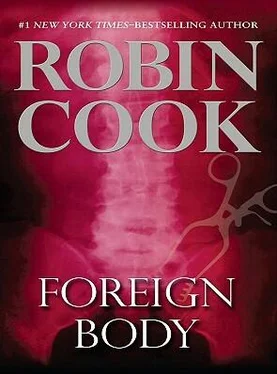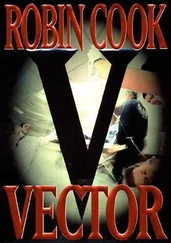“I don’t know what to say!” snapped Rita, angry but confused that Jennifer sounded so sincere.
“Don’t say anything. Just call the hospital, and then call me right back. I actually already called the hospital, but they wouldn’t give me any information, which is silly, since it has already been on international television. I’m staying at the Amal Palace Hotel and will stay here by the phone. Once again, I’m sorry to be the one to have had to call you when it was the hospital’s responsibility.”
The next thing Jennifer knew, she was listening to a dial tone. Rita had hung up on her. Thinking she might have done the same had the situation been reversed, Jennifer slowly hung up the receiver. It gave her a terrible feeling to have been the messenger with such bad news, and she found she hated the role. At the same time, as a physician in training she knew that she might have to do it a number of times over the course of her career.
Knowing that sleep was now completely out of the question, Jennifer wondered what she should do. She thought about reading more in the guidebook but then gave up. She couldn’t concentrate. She began to worry that even if the CNN report had been correct, Rita might leave her in the dark and not call her back in a kind of passive-aggressive reaction, blaming the messenger.
Without coming up with a better idea, Jennifer turned up the volume on the TV and blankly began watching a CNN segment on Darfur. But no sooner had she gotten herself comfortable when her phone rang. She snatched it up practically before the first ring terminated. As she hoped, it was Rita, but Rita’s voice had changed. She was now choked up to the point that it was difficult for her to speak.
“I don’t know who you are or what kind of human being you are, but my husband is dead.”
“I’m terribly sorry, and I certainly didn’t get any pleasure from having had to be the one to tell you. The only reason I was willing to do so is to warn you about the hospital possibly trying to bully you into giving them permission to cremate or embalm.”
“What difference does that make?” Rita snapped.
“Only that if either is done, an autopsy can’t be done. It seems already that there are similarities between your husband’s unexpected passing and my grandmother’s and Mr. Benfatti’s. I would assume your husband’s death was unexpected?”
“Absolutely! We had him cleared by his cardiologist only a month before.”
“It was the same with my grandmother and Mr. Benfatti. To be honest, I’m concerned these deaths are not natural. That’s what I meant when I said something was wrong.”
“What do you mean exactly?”
“I’m concerned these deaths might be intentional.”
“You mean someone killed my husband.”
“Somehow, yes,” Jennifer said, realizing just how paranoid such a statement sounded.
“Why? No one knows us here. There’s no way for someone to benefit.”
“I’ve no clue, I’m afraid. But tomorrow night two forensic pathologists who are friends of mine are arriving. They are going to help me with my grandmother. I could ask them to check your husband’s case, too.” Jennifer knew she was going out on a limb offering Laurie and Jack’s services without consulting them, but she thought they’d be willing to help. Jennifer also knew that in trying to solve a conspiracy, the more cases there were, the more chances of success.
Jennifer could hear Rita blow her nose before coming back on the line. There were catches in her breathing as she tried to control her grief.
“Please, Mrs. Lucas. Don’t let them destroy any potential evidence. We owe it to our loved ones. Also, you could ask whoever found your husband if he was blue. Both my granny and Mr. Benfatti were blue.”
“How would that help?” she demanded, fighting tears.
“I don’t know. In this kind of situation, if what I fear is true, there’s no predicting what facts might solve the mystery. I’ve learned that studying medicine and trying to make a diagnosis. You just don’t know what’s going to be important.”
“Are you a doctor?”
“Not yet. I’m in my last year of medical school. I’ll graduate in June of ’08.”
“Why didn’t you tell me?” she demanded, although with considerably less acrimony.
“I didn’t think it mattered,” Jennifer said, although when she thought about it, she had experienced episodes where people seemed inappropriately to give her opinion more credence, even about issues unrelated to medicine, when they found out she was a medical student.
“I’m not going to promise anything,” Rita said. “But I’m on my way to the hospital now, and I’ll think about what you said. I will call you in the morning.”
“Fair enough,” Jennifer said.
The fact that Rita went on to say good-bye gave Jennifer reason to be optimistic. The woman would not only get back in touch with her but would also cooperate. But as Jennifer thought about this third death in so many nights and its implications, it reminded her of a famous Shakespearean quote: “Something is rotten in the State of Denmark.” At the same time, it did cross her mind that she could be using this conspiracy idea as another way of blocking the real impact of her grandmother’s passing.
October 17, 2007
Wednesday, 10:11 p.m.
New Delhi, India
Ramesh Srivastava did all he could to keep his composure. Here it was after ten at night and he was getting yet another call. To him it has seemed like he’d been on the phone all evening. First it had been his deputy of the department of medical tourism calling to say that his immediate subordinate deputy had called him only minutes earlier with the disappointing news that there’d been a report on CNN of yet another American patient death in a private Indian hospital. It was the third in three days, this time at the Aesculapian Medical Center. What made it particularly newsworthy was that the patient, David Lucas, was only in his forties. No sooner had Ramesh finished that unsettling call than he got a call from Khajan Chawdhry, the CEO of the involved hospital, with all the details as he knew them. Now here was the phone ringing yet again.
“What is it?” Ramesh demanded, with no attempt at sociability. As a high-ranking Indian civil servant, he didn’t expect to be working this hard.
“It is Khajan Chawdhry again, sir,” the CEO said. “I’m sorry to bother you, but a slight problem has developed in relation to one of your specific orders — namely, your insistence there should be no autopsy.”
“How can there be a problem?” Ramesh demanded. “It’s a very simple order.”
Earlier, Khajan had explained the bizarre sequence of events involving David Lucas’s demise, starting with the incipient cyanosis with no airway obstruction, followed by the changes in the heart’s conduction system and a sudden rise in the patient’s temperature and potassium level. As a nonphysician, Ramesh had asked for a translation of the irritating doctor gobbledygook and had been told the man had died of some sort of heart attack/stroke combination as a best-guess hypothesis. Ramesh’s response had been for the attending surgeon to sign the death certificate as exactly that, and under no circumstances ask for an autopsy to be authorized.
“The problem is the wife,” Khajan said sheepishly. “She said she may want an autopsy.”
“People generally do not want autopsies,” Ramesh said irritably. “Did the surgeon talk her into requesting one after I specifically ordered him not to do so?”
“No, the surgeon is well aware of the general negative feeling about autopsies in the private sector, and specifically aware of your feelings in this case. It wasn’t he who has spoken to the wife about an autopsy, but rather another American, by the name of Jennifer Hernandez, who had called her prior to the wife’s even hearing about her husband’s death. It was this Hernandez woman who raised the issue of a possible autopsy by saying several American forensic pathologists were on their way to look at her grandmother, and could look at her husband as well, provided the husband’s body was not cremated or embalmed.”
Читать дальше












